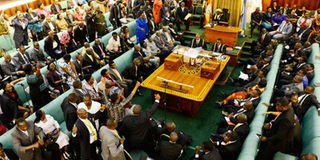MPs and voters must do more than rubberstamp

Members of Parliament in the house. Under the Constitution, only MPs can impose a tax. FILE PHOTO
What you need to know:
The issue: OTT tax
Our view: Our view is that voters should decide their fate at the next elections. Let voters judge them not for their words, but actions.
There is nationwide uproar over new taxes on mobile money transaction and social media use, which took effect on Sunday, July 1, 2018. These comprise 1 per cent excise duty on value of mobile money transaction and Shs200 Over-The-Top (OTT) service levy prepaid daily using mobile money for social media access. This is reminiscent of the Shs18,000 monthly service fees that pioneering mobile telecommunications companies in Uganda imposed on subscribers.
The arising indignation is fuelled by, among others, concerns that the taxes are unfair, suffocate commerce and punish the poor most since the uniform rates are blind to individual incomes.
Litigants have lodged a case in court on, among other grounds, that placing roadblocks on communication pathways breaches individual rights to expression and is unconstitutional. Outside court, the government counter-argues that it has only targeted social media gateway, not entire Internet access. And that it requires to muster more resources to wean the country off donor dependence, provide quality services and meet its expenses.
Our position is that all must pay every legal tax and that citizens must demand and ensure the leaders they elect, from the village to the President, put the monies to right use.
From a public policy perspective, prior wide consultation and education about the taxes alongside mass sensitisation after their introduction would have aided buy-in and diluted citizens’ anger or the unnecessary ruckus. This fury has potential for adverse political ramification.
The exercise of civic duty by citizens coupled with elected leaders’ responsibility and accountability to the electors undergird the social contract for meaningful functioning of politics, democracy and governance. We urge Ugandans not to despair or waste the opportunity in this tax crisis.
Our counsel is for all citizens to choose leaders beyond the attractions of party affiliations and or inducements. Apolitical poise or wrong choices are evidently costly and hurt us all. As a start, let all Ugandans of age register to vote. Each should at any subsequent election attend campaign rallies, evaluate a prospective leader’s messaging and competence and, most importantly, cast the ballot on Election Day.
If we sublet it to others to choose leaders, we lose the right to question or hold them to account.
It is our position that majority Members of Parliament let Ugandans down by failing to either read or properly scrutinise the new taxes, and its effects, when they enacted the Excise Duty (Amendment) Bill, 2018, which introduced the levies. Under the Constitution, only MPs can impose a tax, which they rightly did in this instant case.
Our view is that voters should decide their fate at the next elections. Let voters judge them not for their words, but actions.




